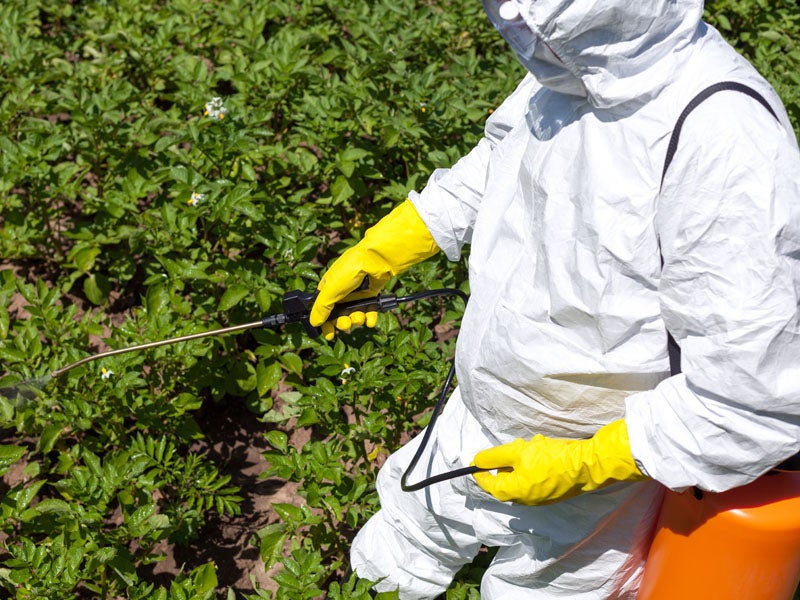Trump Revoked Key Pesticide Protections. We're Fighting Back.
Trump's EPA took away key protections to prevent poisonings in homes and fields. Earthjustice and Farmworker Justice are suing the EPA in response.

This page was published 8 years ago. Find the latest on Earthjustice’s work.
This past January, three brothers—ages 7, 9 and 11—and their 17-year-old sister, died in their home in Amarillo, Texas, because a highly toxic restricted-use pesticide was improperly applied in their home.
And just two years ago, a family on vacation in the U.S. Virgin Islands and another family in Florida were poisoned after applicators grossly misused restricted-use pesticides. The vacationing father and his children were paralyzed; in Florida, the family’s 10-year old son suffered significant brain damage.
These kinds of tragedies prompted the federal government to enact long overdue updates to the Certification of Pesticide Applicators Rule, also known as the CPA Rule. Designed to protect lives from restricted-use pesticides—some of the most hazardous chemicals that can only be used by certified professionals—the rule hadn’t been updated since Nixon was in office.
The EPA’s revised protections were supposed to go into effect in March, but Trump’s new EPA chief, Scott Pruitt, delayed the CPA Rule from going into effect for at least a year. This month, Earthjustice and Farmworker Justice sued the EPA for this unlawful delay.
By delaying this rule, the Trump administration is putting workers, children and families at risk.
The CPA Rule ensures that children are not allowed to apply restricted-use pesticides and that certified applicators get updated annual trainings. It also requires applicators to have access to essential information about the products they use, so that they can wear appropriate protective gear and know what they’ve been exposed to if accidents happen.
By delaying this rule, the Trump administration is putting workers, children and families at risk. They are allowing poorly trained pesticide applicators to handle the most dangerous chemicals in the fields where we grow our food, where we work and where we live.
Although urban dwellers sporadically face these dangerous pesticides in businesses, homes and schools; there are roughly one million farmworkers who, together with their families, face pesticide exposures on a daily basis. As a second generation Chicana who comes from a lineage of laborers, farmworkers, and in general, a population whose children are nearly twice as likely to attend schools in close proximity to use of hazardous pesticides, the EPA’s delay of the CPA Rule is unacceptable to me on a deeply personal level.
We know that in some areas, 16-year-old kids are applying restricted-use pesticides because there is no minimum age limit for the roughly one million certified applicators nationwide. Moreover, most of the farmworkers facing the gravest pesticide risks are not just migrants, they are often low-income Spanish and indigenous language speakers who need these protections the most.
The EPA estimates that as many as 20,000 farmworkers are poisoned by pesticides every year, yet the agency is still delaying action.
The EPA estimates that as many as 20,000 farmworkers are poisoned by pesticides every year, yet the agency is still delaying action. For perspective, this is like saying that we know every inhabitant in a U.S. town will suffer severe pesticide poisoning each year, but we simply prefer not to take action.
The EPA itself said that the now-delayed rule, which was developed after years of reviews, would prevent at least a thousand acute poisonings every year. While this isn’t enough to get to where we need to be, in a society that values all lives alike, this is a much-needed start. None of us should be OK with delaying life-saving rules.
The federal government may be eager to bow to industry barons who care more about profit than life, but we the people have to defend our families and the most vulnerable populations. So while it’s clear that we can’t count on the Trump administration to do the right thing, we can use the power of the law to force them into action.
In fact, that’s exactly what we’re doing.
The California Regional Office fights for the rights of all to a healthy environment regardless of where in the state they live; we fight to protect the magnificent natural spaces and wildlife found in California; and we fight to transition California to a zero-emissions future where cars, trucks, buildings, and power plants run on clean energy, not fossil fuels.
Earthjustice’s Sustainable Food and Farming program aims to make our nation’s food system safer and more climate friendly.